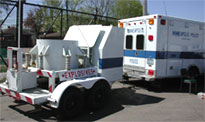March 12, 2019 Guest Post – Meuser Law Office, P.A. “Deposition Tips”

- Arrive on the correct date and time. Wandering in late does not endear you to the attorneys and plants a healthy fear in us as well as a hope in the defense counsel that you will decide not to show up on time for court hearings.
- Dress appropriately. You don’t need to wear a suit or a dress, but clothing with holes or club attire is not acceptable.
- Do not drink or use mood or mind-altering substances before the deposition. This includes going out the night before. If I can smell what you drank the night before, opposing counsel can too. Similarly, if you testify that you do not nor have you ever used tobacco products, yet my eyes are watering from the cloud of smoke around you, this incongruence is not helpful for your case.
- Don’t be surprised if the defense attorney has searched your name in Google or looked through your social media accounts.
- Get some sleep the night before. You may be nervous but as long as you tell the truth it’s very unlikely you are going to hurt your case.
- Try not to talk excessively. Answer the defense attorney’s question directly and succinctly. If he or she wants more information they will ask for it. Volunteering additional information makes a long process longer and can even hurt your case.
- If you aren’t released to drive by your doctors, don’t drive yourself to the deposition. Have someone else take you.
- If you need to take breaks, walk around, or even stand while testifying you can do so! This isn’t court, nor is the purpose to make your injury worse or humiliate you.
- You can bring a spouse or a family member but they are not allowed to talk! Remind them before they walk in, while they may want to help you and you appreciate their support, they will hurt your case if they jump in and try to answer your questions, this includes looking to them for confirmation during the questions.
- During breaks, you may not be “on the record” but you’re still being observed. Part of the purpose of a deposition if for the defense attorney to evaluate your likeableness to a judge or a jury. The attorney evaluates characteristics that may be difficult to ascertain from medical records. Be mindful of this and as such be polite and professional. You aren’t their friend but you should still be respectful.
- Avoid coarse or foul language. If you have to be blunt that is understandable, but using inappropriate language in front of a judge is not a good idea.
- It’s OK if you don’t know an answer. Don’t make up an answer because you think you should know or assume you are expected to know. If you don’t know exact dates, use approximations such as I believe it was in the fall, two years ago.
- If you don’t understand the question, request the attorney to repeat or rephrase it. He or she is generally not trying to trick you or make you feel stupid. It can be difficult to ask a series of questions and sometimes the questions may get formulated awkwardly.
- Turn your phone off. This practice is simply polite. Attorneys forget too and judges are happy to remind them.
- Plan for approximately 2 hours.
- Make sure you speak audibly. Don’t make the court reporter’s job any harder than it already is.
- Remember that you have to speak aloud. If you nod or shake your head, the court reporter can’t record that movement. The same goes for pointing to body parts that cause your pain or describing objects that may have contributed to your injury.
If you or someone you know has suffered from a work injury, contact the experienced attorneys at Meuser Law Office, P.A. to explain your rights under the Minnesota Workers’ Compensation Act, PERA, MSRS, or civil law. We will work to inform you of your rights and maximize your benefits under the law. Contact us today for a free confidential, no-obligation case consultation at 1-877-746-5680.




